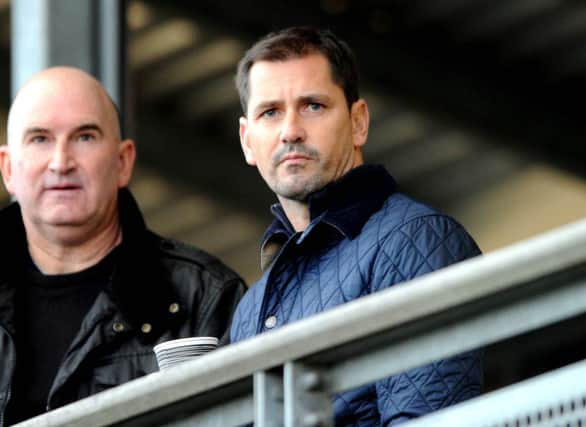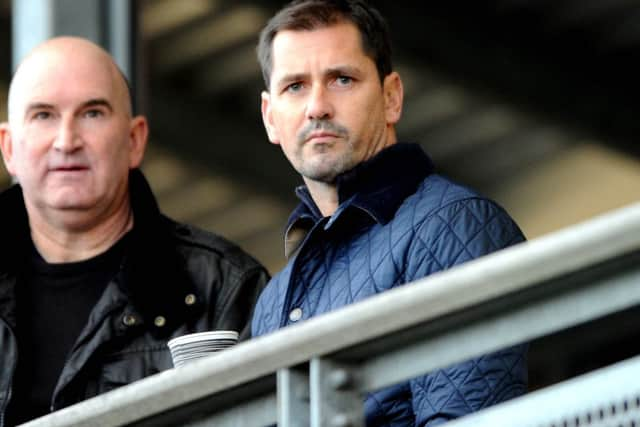Alan Pattullo: Resentment over McNamara’s bonus


However, it is a sign of just how deep the disconnect is between Jackie McNamara and a significant number of supporters that even a win won’t feel like a panacea.
While McNamara might succeed briefly in deflecting attention from himself with a victory, a rather more profound discord has seeped into several relations at the club. Not just between fans and manager, but also between fans and owner, a stung Stephen Thompson. And, dare we say it, between manager and owner.
Advertisement
Hide AdAdvertisement
Hide AdThe poor run of results is bad enough; no wins in nine. But added to this is outrage at the revelation McNamara has benefited financially from the sale of two players whose loss is being directly linked to the club’s reversal of fortunes.


But then, there is nothing new under the pleasingly bright Easter sun. As far back as 1993, when Jim McLean still ruled the roost, transfer fees were being divided up at Tannadice, as well as elsewhere.
Even the strict McLean, no-one’s idea of a spiv, enjoyed being weighed-in when Duncan Ferguson left Tannadice for Rangers. The details are eye-watering, even now. Rangers paid a then British record fee of £4 million, despite Leeds United having had a fee of around £800,000 less accepted just a few weeks earlier.
But Dunc hadn’t wanted to go. McLean was resistant to the idea of him going to another Scottish club. However, he then had a light-bulb moment.
Ferguson was proving troublesome enough at United, how much more difficult would he find life at Ibrox? In what proved to be a perceptive hunch, McLean couldn’t see Ferguson progressing there. So he hiked the asking price up, telling Rangers they could have him. But not before a clause was inserted whereby McLean was assured a “kick-back” of £150,000. Even the scout who identified Ferguson in the first place was given a one per cent cut of the total fee.
In an interview with the Sunday Times in 2004, McLean described his own payment as an “exception”. He also sought to justify it; the fee was a deserved bonus after years when he was paid “peanuts” by the club. It was also a form of pay-back for having himself turned down the chance to join Rangers a decade earlier, when, he recalled, he could have doubled his wages, with a £100,000 house thrown in.
While he himself offered up the detail, McLean was clearly concerned he might appear greedy. He sought to provide some background. He could see it rarely looks good if a manager is benefiting from a transfer, which might be why the revelation took so long to emerge. One of McNamara’s gripes is bound to be that details of his contract have been disseminated so soon after the sale of Stuart Armstrong and Gary Mackay-Steven to Celtic; the wounds remain raw.
It isn’t a fiddle, neither is it a muddle. But it is an avoidable mess. Given what has happened at Rangers, how can anyone criticise a group of fans – in this case the Federation of Dundee United Supporters’ Clubs and ArabTrust – for wishing to know where commission, which they estimated at £500,000 but is described as being far lower by the club, has gone, hence their statement of last Wednesday night. When they didn’t get the answers they wanted, who can blame them for agitating further?
Advertisement
Hide AdAdvertisement
Hide AdBut then attitudes on Sunday night’s edition of Sportscene spoke volumes about the omerta culture of football; yes, everyone knows such things happen. According to Kilmarnock manager Gary Locke and Motherwell striker Scott McDonald, the real crime is that details of McNamara’s contract have been made public.
But perhaps United fans should have been informed long ago that this was the new reality. Rather than be guaranteed a handsome salary, United managers are now being encouraged, via sell-on clauses, to develop players who can earn both the club and themselves a profit.
Some of the unrest is because McNamara seems to have earned commission on the transfer of players he played no part in bringing to the club. There is understandable surprise that he is benefiting from the departure of Mackay-Steven and Armstrong, whose arrival pre-dated the manager’s time at Tannadice. Renumeration for the sale of Andrew Robertson, whose potential was so adeptly judged by McNamara, is a more palatable thought for supporters. So the problem is one of perception. It is also the fact that while McNamara’s bank balance has improved, United’s form has nose-dived. Had the Tannadice side beaten Celtic in the League Cup final, would any of this even have been an issue? It could be argued that the controversy about Jackie’s cut hinged on another cut – the one to Sean Dillon’s shin.
Down to ten men for six minutes as medics sought to patch up the United skipper, McNamara’s side lost their footing in the game by conceding the first goal.
With the chance of cup glory on two fronts now gone, United are reaping the whirlwind. Their fans head to Dens tomorrow in less joyful mood than anyone who watched United hit six against Dundee as recently as the first day of this year could have imagined.
FOLLOW US
SCOTSMAN TABLET AND MOBILE APPS